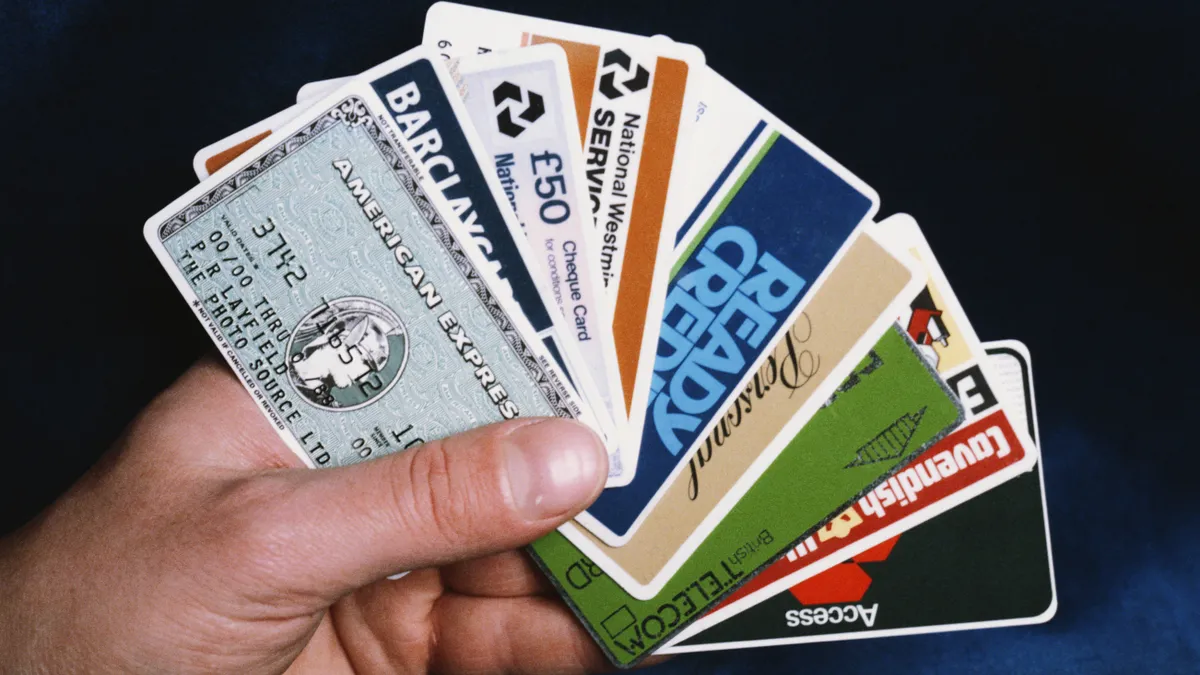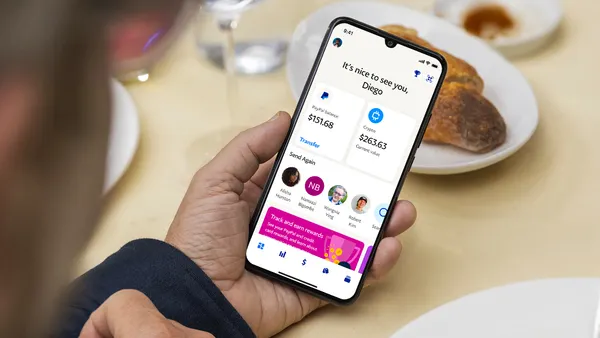Update: June 10, 2021: Marqeta shares rose 13% on their first day of trading Wednesday to close at $30.52 after being price at $27 for the first-time stock sale. The card company raised $1.23 billion after selling 45.5 million shares in the offering, Bloomberg reported.
Dive Brief:
- Marqeta, the 11-year-old credit, debit and prepaid card processing company, filed with the Securities and Exchange Commission (SEC) on Friday to sell shares to the public for the first time. The plan for an initial public offering follows Marqeta more than doubling revenue last year over 2019, and a repeat revenue performance in the first quarter of this year, the filing said.
- The company has been riding a wave of increased digital payments attached to rising e-commerce, accelerated by the COVID-19 pandemic that led to more online and mobile payments when it struck last year. Nonetheless, Marqeta still isn't profitable, with net losses reported for the first quarter of this year and last year, and it expects the losses to continue "for the foreseeable future," according to the SEC filing.
- One private market analyst cited by CNBC said Marqeta's IPO would value the company at as much as $17 billion, based on details in the new filing and the price of shares currently traded in the secondary market. Payments companies have been landing eye-popping valuations in the private market as venture capitalists flock to the category. For instance, payments company Stripe was recently valued at $95 billion.
Dive Insight:
Oakland, California-based Marqeta was founded in 2010 by Jason Gardner, who is still the company's CEO. Previously, Gardner co-founded PropertyBridge, a business that provided rent and lease payment services to apartment management firms, which was sold to Moneygram International for $28 million in 2007.

Marqeta provides payments processing services for physical and virtual credit, debit and prepaid cards, earning the majority of its revenue from the interchange or ‘swipe' fees, associated with use of those cards, but also from other processing services, the company said in the filing.
Entrepreneurs and software developers pioneering new businesses in e-commerce gravitate to its services because its application programming interfaces "provide instant access to our highly scalable, cloud-based, and configurable payment infrastructure," the company said. These businesses have included payments technology company Square, and food delivery companies Instacart and DoorDash.
It disclosed for the first time in the SEC filing that revenue last year more than doubled to $290.3 million, from $143.3 million in 2019. For the first quarter of this year, revenue rose to $108 million, up from $48.4 million.
Its net loss narrowed last year to $47.7 million, from $58.2 million in 2019, and the also narrowed in the first quarter this year to $12.8 million, from $14.5 million, according to the SEC filing.
Nonetheless, Marqeta was upfront in the filing's "risk factor" disclosure about the uncertainty of profits in the future: "We expect to continue to incur net losses for the foreseeable future and we may not achieve or maintain profitability in the future."
Marqeta noted it expects operating expenses to increase as it expands to pursue significant market opportunity, and as it takes on additional functions associated with being a publicly traded company. In describing the potential for its business, Marqeta said that its processing volume last year was $60 billion, an amount that was less than 1% of the $6.7 trillion in U.S. issuer volume estimated by the industry research firm The Nilson Report.
Marqeta noted that its biggest customer by far is Square, the pioneering digital payments processor for small and mid-sized businesses. Square has increasingly become a bigger customer too, accounting for 70% of Marqeta's revenue last year, and then 73% in the first quarter, according to the filing. "If Square were to see a slowdown in its business or use our Platform in a reduced capacity, our business, results of operations, and financial condition could be adversely affected," the Marqeta filing said.
Other Marqeta customers include buy now-pay later (BNPL) payments companies Klarna and Affirm, which are two of the largest in that arena.
Competition comes from incumbent and upstart companies alike. Marqeta listed big legacy payments processors Fiserv, Fidelity National Information Services (FIS) and Global Payments, as well as newcomers Stripe and Adyen among its rivals.
Marqeta aims to increase its capitalization and financial flexibility with the offering, as well as give existing shareholders an opportunity to sell stock, the filing said. It will use net proceeds of the offering for working capital and general corporate purposes, including its expansion strategy, which could include acquisitions.
Marqeta didn't say exactly how many shares it will sell, what they'll be priced at or when the offering will take place. Those details will be disclosed later.
The company initially filed confidentially with the SEC in February, according to Reuters report at that time, with a source familiar with the matter telling the news service then that the company was "eyeing" a valuation of about $10 billion, but noting that could change with market conditions.










